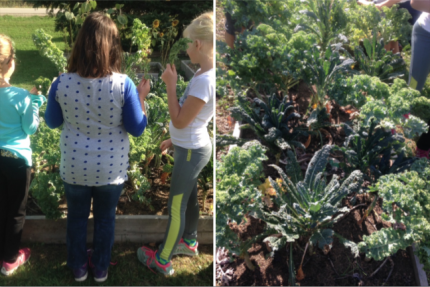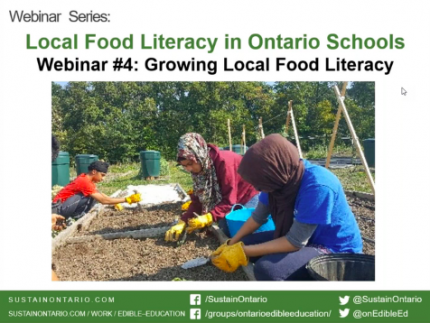A Q&A Lesson in Local Food Literacy: How can I make local food literacy with my school garden manageable?
Posted: February 14, 2018
Categories: Edible Education Network / Good Food Ideas for Kids / GoodFoodBites / News from Sustain Ontario / Schools
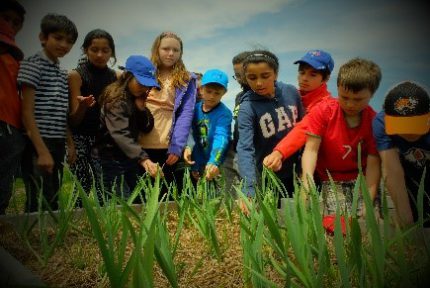 We hope you enjoyed our first blog post in a series on bringing Local Food Literacy into Ontario schools. This blog series is intended to widely share the content from the Local Food Literacy in Schools FAQ Guide, developed by Sustain Ontario, Ecosource, FoodShare and Roots to Harvest.
We hope you enjoyed our first blog post in a series on bringing Local Food Literacy into Ontario schools. This blog series is intended to widely share the content from the Local Food Literacy in Schools FAQ Guide, developed by Sustain Ontario, Ecosource, FoodShare and Roots to Harvest.
Thanks to all who have joined the conversation on Twitter so far and shared the first ‘lesson’!
Our second lesson will explore…
How can I make local food literacy with my school garden manageable?
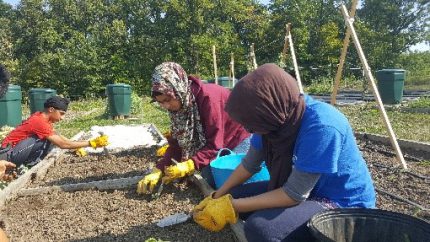 Q: I really want to use our school garden to teach my class about things like local food systems and health. But using the garden can be overwhelming and student interest is all over the place. Are there any tips for how to make local food literacy with the school garden more manageable, and how I can better engage my students in the garden (without it taking up all of my time)?
Q: I really want to use our school garden to teach my class about things like local food systems and health. But using the garden can be overwhelming and student interest is all over the place. Are there any tips for how to make local food literacy with the school garden more manageable, and how I can better engage my students in the garden (without it taking up all of my time)?
Start Small! Don’t feel like you need to use your entire greenspace. Start with a few containers or portion off a section and work in that small space. As you build confidence and knowledge you can start expanding.
Try to get a lot of teachers into the garden. More hands are better; allocate some easy tasks for teachers and classes who don’t have a lot of experience and knowledge. Watering, weeding pathways, and mulching are easy activities to learn.
Get students involved in decision making. Brainstorm veggies based on your climate and season; give out stickers, and let students ‘vote’ on what to grow using dotmocracy.
Getting students involved in maintaining a school garden has proven to reap a multitude of benefits and in many types of learning, right here in Ontario! In fact, one teacher from a middle school has shared:
“Students on the autism spectrum have been enjoying working with the tower gardens and it has had an impact on their concentration and even writing skills. A teacher noted that one student on the autism spectrum who had very poor attendance last year has barely missed a day of school this year, and she thinks it has something to do with the student’s attachment to maintaining and interacting with the tower.
Another student who had difficulty coming up with subjects to write about during freestyle journalling time was able to write freely and with expanded vocabulary when it came to writing about the tower.”
Choose your plants wisely. It’s more manageable if you plant things that are easy to maintain and quick-growing, especially since you’re not likely to be at school in the summer.
- Plant pollinator friendly edible flowers (e.g. nasturtiums, borage). They don’t need much care and are fun to grow.
- Plant quick growing spring crops to harvest before the summer (e.g. radishes, lettuces, spinach).
- Or plant crops that will survive the summer with little watering (e.g. winter squash, potatoes).
- If you’re worried that the garden will look a little wild, make signs that say “Pollinator friendly garden” or “We’re growing these plants for seed”.
Connect with community groups for summer maintenance. Is there a nearby library or community centre with a summer program that could water the garden over the summer?
Involve members of your community, including your elders.
Use what’s already out there. Some favourite places to find online garden resources include:
FoodShare’s Educator Resources
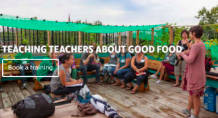
FoodShare’s website provides curriculum-linked lesson plans including activities for the school garden.
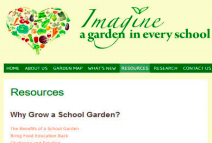 Imagine a Garden in Every School
Imagine a Garden in Every School
The IGES website includes a map of school gardens in Ontario (put yourself on the map!) and a wide range of school garden resources.
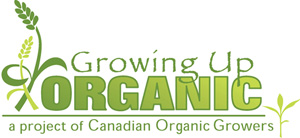
Growing up Organic’s website offers a wide range of curriculum-linked gardening lesson plans and activities for students from JK – Gr. 12.
Elin Marley of Seedlingstories also previously sent us a wonderful school food garden resource focused on curriculum links, which you can check out here.
For more information on how to teach local food literacy using your school garden, check out our Growing Local Food Literacy webinar recording and tipsheet.
And as always, if you have any of your own ideas or resources, please share with us on Twitter!


